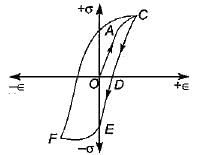Mechanical Engineering Exam > Mechanical Engineering Questions > The loss of strength in compression due to ov...
Start Learning for Free
The loss of strength in compression due to overloading is known as
- a)Hysteresis
- b)Creep
- c)Bauschinger effect
- d)Relaxation
Correct answer is option 'C'. Can you explain this answer?
Verified Answer
The loss of strength in compression due to overloading is known asa)Hy...

(Bauschinger effect and hysteresis loop) Due to stress loading unloading, the yield stress in tension gets increased and yield stress in compression gets decreased. This decreasing of yield stress in compression is the Bauschinger effect.
 This question is part of UPSC exam. View all Mechanical Engineering courses
This question is part of UPSC exam. View all Mechanical Engineering courses
Most Upvoted Answer
The loss of strength in compression due to overloading is known asa)Hy...
Bauschinger effect in Mechanical Engineering:
The Bauschinger effect is a phenomenon in material science and engineering where the loss of strength in compression due to overloading is observed. It is named after Johann Bauschinger, a German engineer who discovered this effect in 1886.
Explanation:
When a metal is subjected to tensile stress, it elongates, and when it is subjected to compressive stress, it contracts. However, if the metal is first subjected to compressive stress and then to tensile stress, it will not return to its original length. Instead, it will have a permanent deformation. This is the Bauschinger effect.
The Bauschinger effect is caused by the dislocations in the metal. When the metal is subjected to compressive stress, the dislocations move in the opposite direction to the tensile stress, making it harder for the metal to recover its original shape. This results in a loss of strength in compression.
The Bauschinger effect is more pronounced in metals with a high dislocation density, such as cold-worked metals. It is also affected by the temperature and the rate of loading.
Applications:
The Bauschinger effect is an important consideration in material science and engineering, especially in the design of structures and machines that are subjected to cyclic loading. Engineers must take into account the effect of the previous loading history on the mechanical properties of the material.
The Bauschinger effect is also important in the manufacturing of metals. The effect can be used to improve the formability of metals by pre-straining them in the opposite direction to the desired deformation. This process is known as reverse yielding.
Conclusion:
In conclusion, the Bauschinger effect is a phenomenon in material science and engineering where the loss of strength in compression due to overloading is observed. It is caused by the dislocations in the metal and is more pronounced in metals with a high dislocation density. The Bauschinger effect is important in the design of structures and machines that are subjected to cyclic loading and in the manufacturing of metals.
The Bauschinger effect is a phenomenon in material science and engineering where the loss of strength in compression due to overloading is observed. It is named after Johann Bauschinger, a German engineer who discovered this effect in 1886.
Explanation:
When a metal is subjected to tensile stress, it elongates, and when it is subjected to compressive stress, it contracts. However, if the metal is first subjected to compressive stress and then to tensile stress, it will not return to its original length. Instead, it will have a permanent deformation. This is the Bauschinger effect.
The Bauschinger effect is caused by the dislocations in the metal. When the metal is subjected to compressive stress, the dislocations move in the opposite direction to the tensile stress, making it harder for the metal to recover its original shape. This results in a loss of strength in compression.
The Bauschinger effect is more pronounced in metals with a high dislocation density, such as cold-worked metals. It is also affected by the temperature and the rate of loading.
Applications:
The Bauschinger effect is an important consideration in material science and engineering, especially in the design of structures and machines that are subjected to cyclic loading. Engineers must take into account the effect of the previous loading history on the mechanical properties of the material.
The Bauschinger effect is also important in the manufacturing of metals. The effect can be used to improve the formability of metals by pre-straining them in the opposite direction to the desired deformation. This process is known as reverse yielding.
Conclusion:
In conclusion, the Bauschinger effect is a phenomenon in material science and engineering where the loss of strength in compression due to overloading is observed. It is caused by the dislocations in the metal and is more pronounced in metals with a high dislocation density. The Bauschinger effect is important in the design of structures and machines that are subjected to cyclic loading and in the manufacturing of metals.

|
Explore Courses for Mechanical Engineering exam
|

|
Question Description
The loss of strength in compression due to overloading is known asa)Hysteresisb)Creepc)Bauschinger effectd)RelaxationCorrect answer is option 'C'. Can you explain this answer? for Mechanical Engineering 2025 is part of Mechanical Engineering preparation. The Question and answers have been prepared according to the Mechanical Engineering exam syllabus. Information about The loss of strength in compression due to overloading is known asa)Hysteresisb)Creepc)Bauschinger effectd)RelaxationCorrect answer is option 'C'. Can you explain this answer? covers all topics & solutions for Mechanical Engineering 2025 Exam. Find important definitions, questions, meanings, examples, exercises and tests below for The loss of strength in compression due to overloading is known asa)Hysteresisb)Creepc)Bauschinger effectd)RelaxationCorrect answer is option 'C'. Can you explain this answer?.
The loss of strength in compression due to overloading is known asa)Hysteresisb)Creepc)Bauschinger effectd)RelaxationCorrect answer is option 'C'. Can you explain this answer? for Mechanical Engineering 2025 is part of Mechanical Engineering preparation. The Question and answers have been prepared according to the Mechanical Engineering exam syllabus. Information about The loss of strength in compression due to overloading is known asa)Hysteresisb)Creepc)Bauschinger effectd)RelaxationCorrect answer is option 'C'. Can you explain this answer? covers all topics & solutions for Mechanical Engineering 2025 Exam. Find important definitions, questions, meanings, examples, exercises and tests below for The loss of strength in compression due to overloading is known asa)Hysteresisb)Creepc)Bauschinger effectd)RelaxationCorrect answer is option 'C'. Can you explain this answer?.
Solutions for The loss of strength in compression due to overloading is known asa)Hysteresisb)Creepc)Bauschinger effectd)RelaxationCorrect answer is option 'C'. Can you explain this answer? in English & in Hindi are available as part of our courses for Mechanical Engineering.
Download more important topics, notes, lectures and mock test series for Mechanical Engineering Exam by signing up for free.
Here you can find the meaning of The loss of strength in compression due to overloading is known asa)Hysteresisb)Creepc)Bauschinger effectd)RelaxationCorrect answer is option 'C'. Can you explain this answer? defined & explained in the simplest way possible. Besides giving the explanation of
The loss of strength in compression due to overloading is known asa)Hysteresisb)Creepc)Bauschinger effectd)RelaxationCorrect answer is option 'C'. Can you explain this answer?, a detailed solution for The loss of strength in compression due to overloading is known asa)Hysteresisb)Creepc)Bauschinger effectd)RelaxationCorrect answer is option 'C'. Can you explain this answer? has been provided alongside types of The loss of strength in compression due to overloading is known asa)Hysteresisb)Creepc)Bauschinger effectd)RelaxationCorrect answer is option 'C'. Can you explain this answer? theory, EduRev gives you an
ample number of questions to practice The loss of strength in compression due to overloading is known asa)Hysteresisb)Creepc)Bauschinger effectd)RelaxationCorrect answer is option 'C'. Can you explain this answer? tests, examples and also practice Mechanical Engineering tests.

|
Explore Courses for Mechanical Engineering exam
|

|
Signup for Free!
Signup to see your scores go up within 7 days! Learn & Practice with 1000+ FREE Notes, Videos & Tests.


















